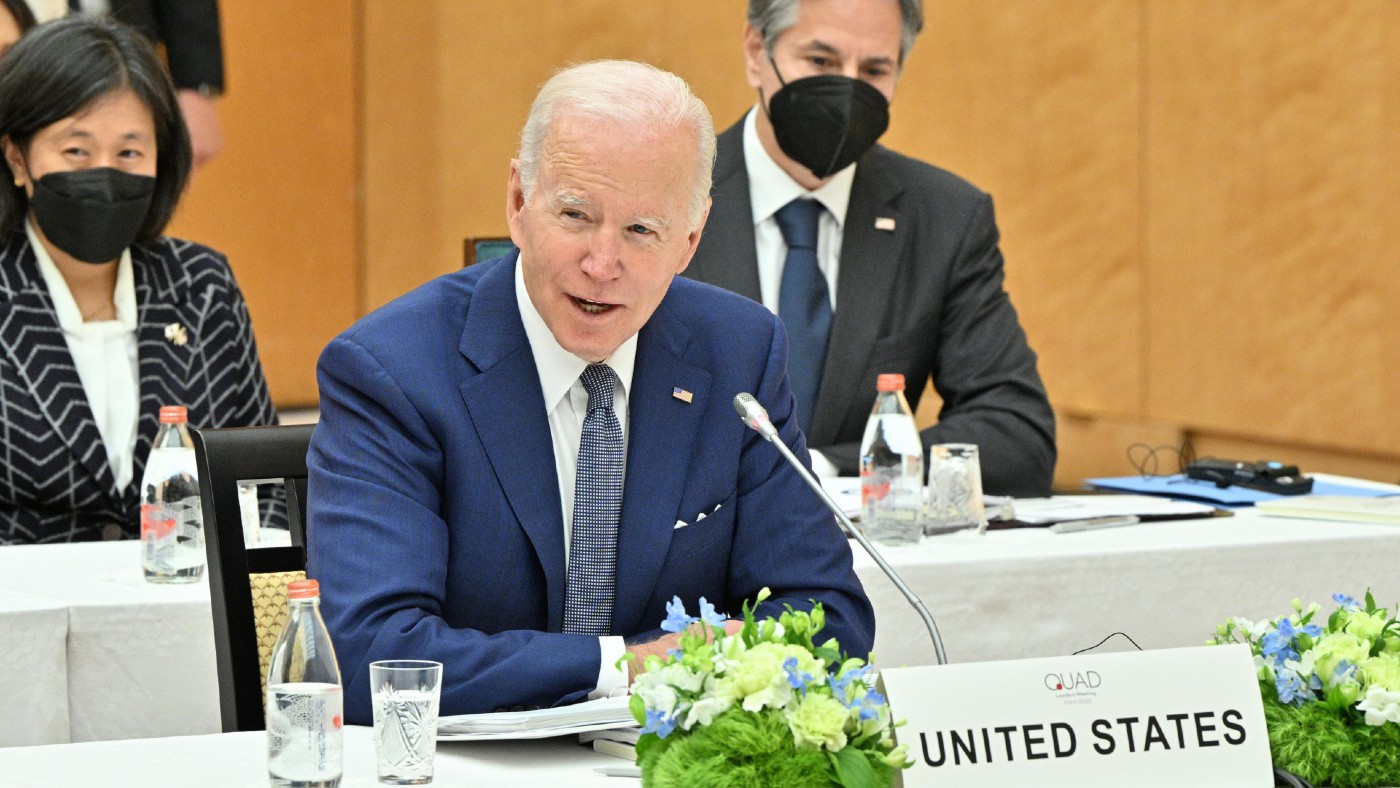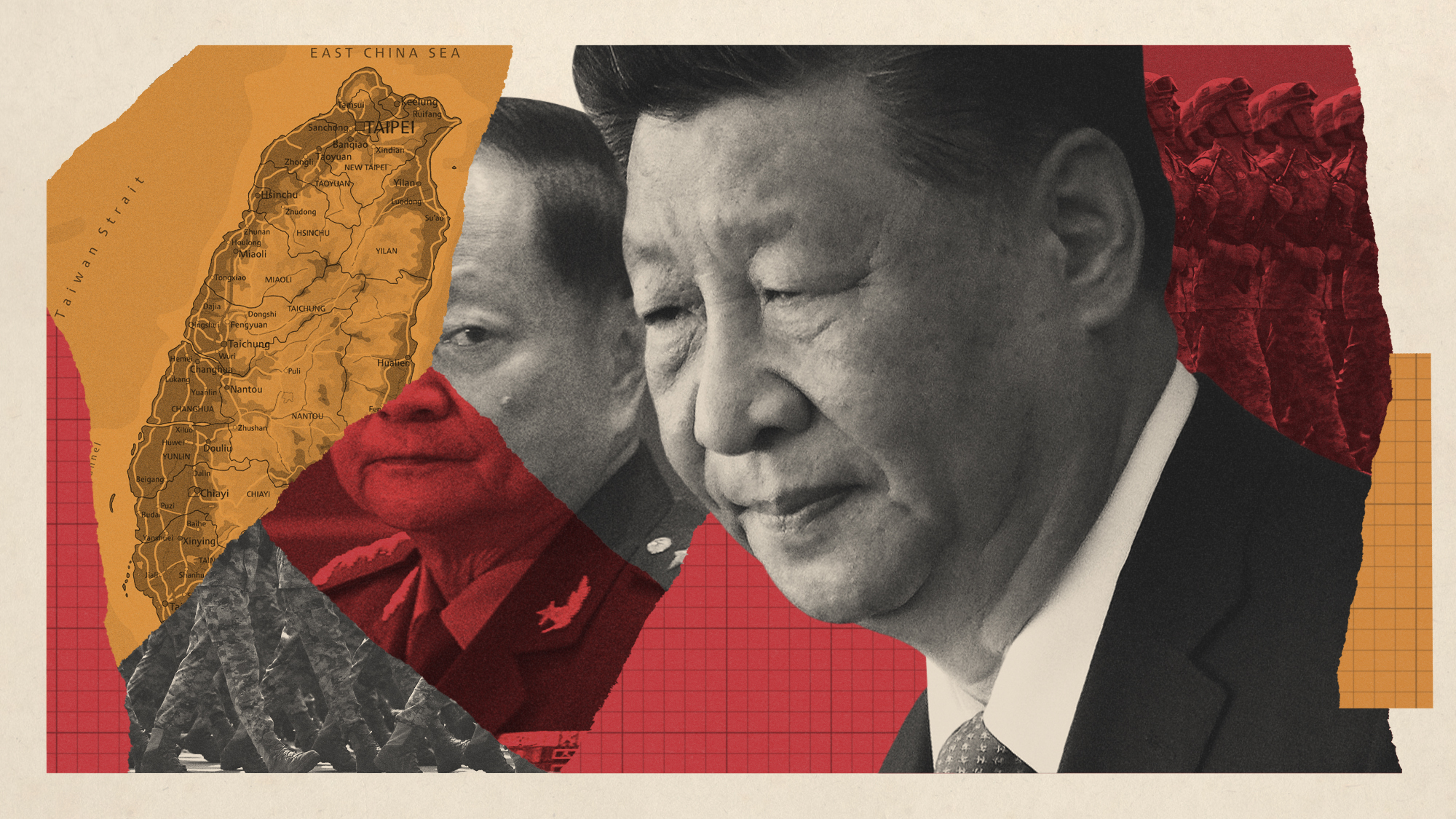Is Joe Biden taking a tougher stance on Taiwan?
Eyebrows raised after president said US would intervene militarily if China attacked

A free daily email with the biggest news stories of the day – and the best features from TheWeek.com
You are now subscribed
Your newsletter sign-up was successful
Is President Biden confused, or is he ditching decades of US foreign policy? That’s what everybody is asking in the wake of his latest remarks about Taiwan, said Stephen Collinson on CNN. In Tokyo this week, during his first presidential tour of East Asia, Biden told a reporter that the US would intervene militarily if China attacked Taiwan. “That’s the commitment we made,” he said.
The US has actually made no such commitment. For 43 years, it has maintained a policy of “strategic ambiguity”. This has involved both acknowledging (but not endorsing) Beijing’s position that Taiwan is part of China, and pledging to help the island defend itself with US-made weapons, while remaining deliberately vague about whether American/US forces would be deployed. Biden is “a master of the verbal muddle”, said The Wall Street Journal, and White House aides hastily “walked back” his comments. But this was the third time in a year that Biden had indicated that the US would come to Taiwan’s aid. Perhaps he meant it.
Biden should be commended for his “plain speaking”, said The Times. China has been stepping up its incursions into Taiwan’s airspace and relentlessly targeting the island with cyberattacks. Now is the time for the US to drop the “subtle signalling” in favour of a more muscular line. Biden didn’t so much “end strategic ambiguity as modify it”, said The Washington Post. He has given Beijing “new reasons to think long and hard before sending its armed forces across the Taiwan Strait”.
The Week
Escape your echo chamber. Get the facts behind the news, plus analysis from multiple perspectives.

Sign up for The Week's Free Newsletters
From our morning news briefing to a weekly Good News Newsletter, get the best of The Week delivered directly to your inbox.
From our morning news briefing to a weekly Good News Newsletter, get the best of The Week delivered directly to your inbox.
Biden is playing with fire, said David Smith in The Guardian. America’s delicate balancing act on Taiwan has been designed not just to deter China from invading, but also to deter Taiwan from declaring full independence. “Either scenario would trigger a major geopolitical crisis.”
Alas, some US strategists seem to have drawn “the wrong lessons” from the Russian invasion of Ukraine, said Lyle Goldstein on UnHerd. They think it underlines the need for a tougher stance on Taiwan, but the reality is that the US is in no position to threaten Beijing over the island. “A series of war games has demonstrated that the US would likely lose a conflict with China over Taiwan”, owing to basic geography and the fact that Beijing would be far more committed to the fight. America would be well-advised to stick with its ambiguous approach on Taiwan, and try to help Taipei find a “creative diplomatic compromise” with the mainland. Raising unrealistic expectations of a US military intervention only risks poisoning US-China relations
A free daily email with the biggest news stories of the day – and the best features from TheWeek.com
-
 Local elections 2026: where are they and who is expected to win?
Local elections 2026: where are they and who is expected to win?The Explainer Labour is braced for heavy losses and U-turn on postponing some council elections hasn’t helped the party’s prospects
-
 6 of the world’s most accessible destinations
6 of the world’s most accessible destinationsThe Week Recommends Experience all of Berlin, Singapore and Sydney
-
 How the FCC’s ‘equal time’ rule works
How the FCC’s ‘equal time’ rule worksIn the Spotlight The law is at the heart of the Colbert-CBS conflict
-
 Local elections 2026: where are they and who is expected to win?
Local elections 2026: where are they and who is expected to win?The Explainer Labour is braced for heavy losses and U-turn on postponing some council elections hasn’t helped the party’s prospects
-
 How corrupt is the UK?
How corrupt is the UK?The Explainer Decline in standards ‘risks becoming a defining feature of our political culture’ as Britain falls to lowest ever score on global index
-
 Democrats push for ICE accountability
Democrats push for ICE accountabilityFeature U.S. citizens shot and violently detained by immigration agents testify at Capitol Hill hearing
-
 Fulton County: A dress rehearsal for election theft?
Fulton County: A dress rehearsal for election theft?Feature Director of National Intelligence Tulsi Gabbard is Trump's de facto ‘voter fraud’ czar
-
 ‘Melania’: A film about nothing
‘Melania’: A film about nothingFeature Not telling all
-
 What do Xi’s military purges mean for Taiwan?
What do Xi’s military purges mean for Taiwan?Today’s Big Question Analysts say China’s leader is still focused on reunification
-
 Greenland: The lasting damage of Trump’s tantrum
Greenland: The lasting damage of Trump’s tantrumFeature His desire for Greenland has seemingly faded away
-
 Minneapolis: The power of a boy’s photo
Minneapolis: The power of a boy’s photoFeature An image of Liam Conejo Ramos being detained lit up social media